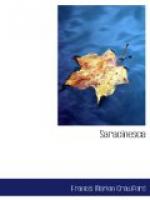“Spicca,” said the latter. “Wherever Spicca is concerned there is a duel. He is a terrible fellow, with his death’s-head and dangling bones—one of those extraordinary phenomena—bah! it makes one shiver to think of him!” The old fellow made the sign of the horns with his forefinger and little finger, hiding his thumb in the palm of his hand, as though to protect himself against the evil eye—the sinister influence invoked by the mention of Spicca. Old Astrardente was very superstitious. The ambassador laughed, and even Corona smiled a little.
“Yes,” said the diplomatist, “Spicca is a living memento mori; he occasionally reminds men of death by killing them.”
“How horrible!” exclaimed Corona.
“Ah, my dear lady, the world is full of horrible things.”
“That is not a reason for making jests of them.”
“It is better to make light of the inevitable,” said Astrardente. “Are you ready to go home, my dear?”
“Quite—I was only waiting for you,” answered Corona, who longed to be at home and alone.
“Let me know the result of old Saracinesca’s warlike undertakings,” said Astrardente, with a cunning smile on his painted face. “Of course, as he consulted you, he will send you word in the morning.”
“You seem so anxious that there should be a duel, that I should almost be tempted to invent an account of one, lest you should be too grievously disappointed,” returned the diplomatist.
“You know very well that no invention will be necessary,” said the Duca, pressing him, for his curiosity was roused.
“Well—as you please to consider it. Good night,” replied the ambassador. It had amused him to annoy Astrardente a little, and he left him with the pleasant consciousness of having excited the inquisitive faculty of his friend to its highest pitch, without giving it anything to feed upon.
Men who have to do with men, rather than with things, frequently take a profound and seemingly cruel delight in playing upon the feelings and petty vanities of their fellow-creatures. The habit is as strong with them as the constant practice of conjuring becomes with a juggler; even when he is not performing, he will for hours pass coins, perform little tricks of sleight-of-hand with cards, or toss balls in the air in marvellously rapid succession, unable to lay aside his profession even for a day, because it has grown to be the only natural expression of his faculties. With men whose business it is to understand other men, it is the same. They cannot be in a man’s company for a quarter of an hour without attempting to discover the peculiar weaknesses of his character—his vanities, his tastes, his vices, his curiosity, his love of money or of reputation; so that the operation of such men’s minds may be compared to the process of auscultation—for their ears are always upon their neighbours’ hearts—and their conversation to the percutations of a physician to ascertain the seat of disease in a pair of consumptive lungs.




